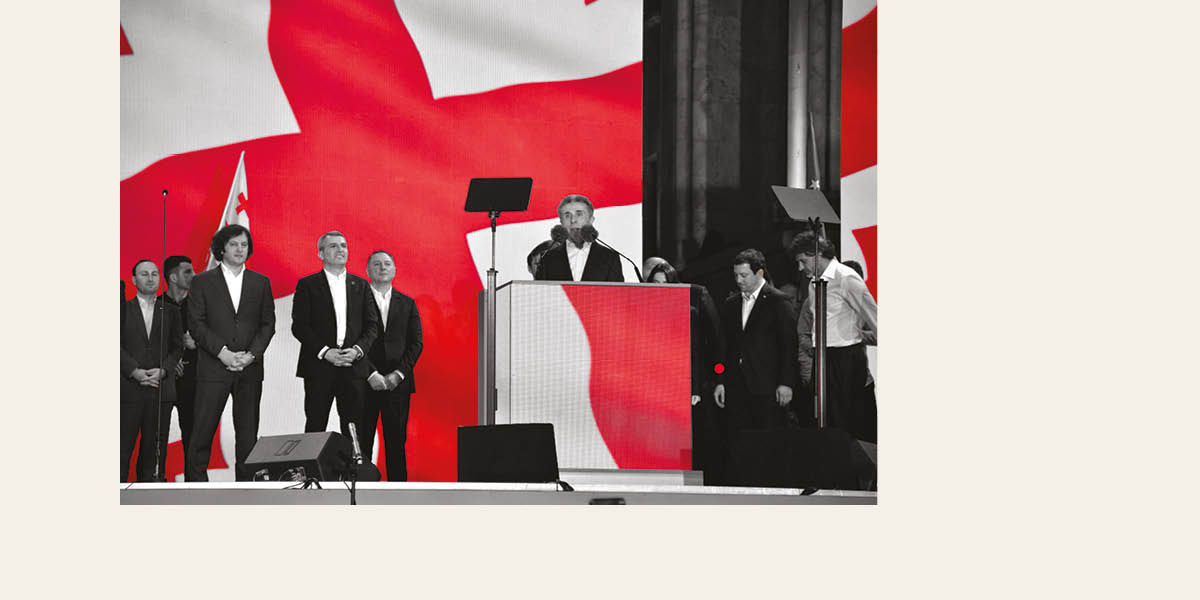Georgia’s secretive ruler lives in a glass palace that would make a Bond villain blush. Perched above the capital city of Tbilisi, reclusive billionaire Bidzina Ivanishvili’s residence reportedly even features a shark tank.
But Ivanishvili isn’t just the richest man in Georgia (his net worth is around a fifth of the country’s GDP). He is also the most powerful person in the country. His only formal title is honorary chair of the ruling Georgian Dream party. But no one in Georgia seriously doubts that the buck stops with Ivanishvili. This can be seen at ruling party rallies where Ivanishvili himself appears behind bulletproof glass, while others, like the prime minister, Irakli Kobakhidze, are unprotected.
Meanwhile, the streets of the city below Ivanishvili’s palace seethe with anger. After an October election widely condemned as unfair handed Georgian Dream a tainted victory, the entire opposition, and the country’s president, refused to recognise the results. But it was PM Irakli Kobakhidze’s 28 November announcement that Georgia would be suspending its EU membership bid that brought hundreds of thousands onto the streets. Polls consistently put support for EU membership at above 80 per cent and until now it has been one of the few points of cross-party political consensus in the country. But when the ruling party, which had campaigned on the slogan ‘Towards the EU with dignity’ appeared to brazenly U-turn and suspend the bid – to the Kremlin’s delight – a huge wave of anger erupted.
This was no tame middle-class protest. Youths banged on the metal barriers in front of parliament and clashed with both police and non-uniformed regime thugs who resorted to brutal and sometimes indiscriminate beatings of protesters. In the absence of strong unions, workers organised brief wildcat strikes and held marches. Construction workers protested on their cranes, and even IT workers staged their own march.
Now, the fight for Georgia’s democracy has become a protracted struggle, with the daily protests in towns and cities across Georgia demanding fresh elections to be held under international supervision and a return to the EU path.
Georgia in Europe
For some in the west, the fact that joining a famously opaque multilateral bureaucracy would raise such radical passions seems mystifying. But the Georgian masses aren’t protesting because they are in love with Brussels bureaucracy, but because they see joining the EU as an act of decolonisation.
Much lazy analysis of the situation tends to fall back on clichés about the situation being a geopolitical tug-of-war between the west and Georgia’s former imperial masters in Russia. The reality is rather different. While Russia is indeed interested in subjugating its southern neighbour, the west is a weak and ineffective force in this part of the world.
The Georgian masses are not protesting because they are in love with Brussels bureaucracy, but because they see joining the EU as an act of decolonisation
Georgia is not of key strategic interest to many EU countries, never mind the US. It has received significant financial support from the west and was accepted as an EU candidate in 2023. But this obscures the underlying reality that for decades Georgia’s attempts to draw itself closer to Europe were largely unrequited.
This means that the real battle taking place on the streets is not between Russia and the west, but between a Russia-backed corrupt billionaire and a people who see Europe as a relatively progressive alternative to oppressive oligarch rule. Contrary to the British view of Brussels as a threat to independence, for Georgians, the EU is perceived as perhaps the only path to protecting the country’s independence and fundamental human rights from the Russian colonial yoke. Hence Georgians see the fight as existential. This is especially the case for younger people and those from the LGBT community, who have been targeted by a recent ‘anti-LGBT propaganda law’ similar to Margaret Thatcher’s Section 28 prohibiting local councils’ ‘promotion’ of homosexuality.
Against Russian Imperialism
It is absolutely true that, as with Ukraine, Russia sees control of Georgia as part of its project to rebuild its lost empire. Georgia fought a short war with Russia in 2008 as a result of which Russian troops occupy one fifth of the country’s territory. It also seems increasingly clear that, despite mealy-mouthed statements of support for Ukraine, Ivanishvili’s Georgian Dream has placed its bet on Russian victory in that war and is seeking to gain Russian favour to help it remain in power indefinitely.
Like other Putin allies, such as Hungary’s Viktor Orban, Ivanishvili has also adopted far-right talking points and presents what he calls ‘liberal fascism’ as a threat to traditional conservative values. But what motivates the billionaire and his cronies is not some deep love for Putin, or even genuine support for the far-right Eurosceptic agenda it now claims to espouse. At his core, Ivanishvili is motivated by conserving his power and wealth at all costs, not by ideology. But it is his willingness to risk falling back under the imperial shadow of a warmongering Russian regime to do this that has turned rumbling discontent into a mass resistance movement.
If this resistance fails, Georgia could be set back by decades and fall back under Russian influence as it did a century ago. This history isn’t lost among the protesters. Among the crowds, there are flags of Georgia’s first democratic socialist republic that existed between 1918-1921 21 before being crushed by the Russian army. That Menshevik government was one of the first democratically elected socialist governments in the world. In just three years it successfully redistributed land and attracted the solidarity of socialists across the world. Visitors included the future UK prime minister Ramsay MacDonald. But it was cut short by Soviet imperial ambitions.
The youth on the streets of Georgia are fighting to ensure this history is never repeated. They deserve our solidarity.










